
AI-Based Personalization in ABM: The Competitive Advantage You Cannot Ignore
Traditional ABM struggles with static data and manual processes, making personalization ineffective. AI changes this by analyzing real-time intent signals, automating engagement, and predicting buyer behavior. Businesses using AI-driven ABM strategies see improved targeting, higher conversion rates, and shorter sales cycles. Read on.
Despite heavy investments in Account-Based Marketing (ABM), many businesses struggle to see meaningful engagement. Personalized outreach often feels anything but personal, account selection is still largely manual, and sales cycles remain frustratingly long. The problem? Traditional ABM lacks real-time intelligence, making it difficult to deliver the right message to the right account at the right time.
This is where AI-based personalization in ABM changes the game. By analyzing vast amounts of intent data, engagement patterns, and behavioral signals, AI enables businesses to create highly targeted, dynamic experiences that resonate with decision-makers.
Instead of broad segmentation, AI pinpoints which accounts are ready to convert, what they care about, and how to engage them most effectively, leading to faster deal closures and higher revenue. AI is not just improving ABM but making personalization at scale a reality.
Key Takeaways
- AI-based personalization enables real-time, data-driven engagement, ensuring marketing efforts align with buyer intent.
- Predictive analytics help businesses prioritize high-value accounts, leading to faster conversions and optimized sales cycles.
- AI tools are scalable, making advanced personalization accessible for businesses of all sizes, not just enterprises.
- Quick and seamless integrations with existing marketing and sales platforms allow businesses to implement AI without major disruptions.
- AI enhances, rather than replaces, human decision-making by automating repetitive tasks and providing actionable insights.
The Core of AI-Based Personalization in ABM
Traditional ABM often relies on static data and predefined account lists, leaving businesses guessing about when and how to engage prospects. AI-based personalization eliminates this guesswork by leveraging real-time data, predictive insights, and automated personalization to create highly relevant and timely interactions.
AI Analyzes Customer Behavior, Intent Signals, and Engagement Patterns
AI continuously collects and processes vast amounts of data from multiple touchpoints—website visits, content downloads, email interactions, social media activity, and third-party intent data. Instead of relying on outdated firmographics or past interactions, AI detects real-time behavioral signals to understand:
- Who is actively researching solutions similar to yours?
- What topics or pain points are they focused on?
- How engaged are they with your brand compared to competitors?
Real-Time Content Personalization Based on Account Interactions
Personalization in ABM is no longer just about adding a prospect’s name to an email. AI takes personalization a step further by dynamically adapting content, messaging, and outreach strategies based on each account’s real-time behavior. For example:
- Website experiences adjust on the fly, a returning prospect sees industry-specific case studies instead of generic landing pages.
- Email sequences evolve based on engagement, if a prospect clicks on a specific topic, follow-ups automatically align with their interest.
- Ad campaigns are hyper-targeted, AI segments audiences in real time, serving personalized ads that match where an account is in the buying journey.
Predictive Analytics: How AI Anticipates Account Needs Before They Act
One of AI’s biggest advantages in ABM is its ability to forecast which accounts are likely to take action next and what they will need. AI-driven predictive analytics leverage historical data, intent signals, and buying patterns to:
- Identify accounts moving from awareness to consideration before explicitly showing interest.
- Recommend optimal outreach timing so sales teams engage prospects when they are most receptive.
- Suggest personalized content strategies tailored to each account’s unique behavior.
The Role of AI in Marketing Personalization
Understanding AI and Its Application in Marketing Strategies
Artificial Intelligence transforms marketing by enabling data-driven decision-making and automation. In account-based marketing (ABM), AI-powered tools process vast datasets, identifying behavioral patterns and predicting future actions. Machine learning algorithms refine audience segmentation, ensuring targeted engagement with high-value prospects.
Natural language processing (NLP) enhances content recommendations, while AI-powered predictive analytics optimize outreach timing. These technologies eliminate guesswork, allowing marketing teams to focus strategies based on real-time insights. AI-driven chatbots further personalize interactions, delivering relevant responses based on customer queries and browsing behavior.
How AI Facilitates Deeper Personalization at Scale
AI personalizes marketing efforts by analyzing customer data at an unprecedented scale. Traditional personalization relies on static segementation, but AI dynamically adjusts messaging based on real-time interactions. Machine learning models continuously refine recommendations, tailoring campaigns to individual preferences.
- Behavioral Tracking:
- Real-Time Predictive Modeling:
- Dynamic Content Customization:
- Automated Audience Segmentation:
AI monitors interactions across multiple channels, gathering insights on browsing history, content consumption, and engagement.
Algorithms predict user intent based on previous behaviors, improving lead nurturing strategies.
AI ensures that email campaigns, landing pages, and advertisements reflect user interests, increasing conversion rates.
Advanced models group prospects based on shared behaviors, refining targeting for more effective ABM campaigns.
AI’s Capacity for Learning and Adapting to Unique Customer Profiles
Machine learning and AI continuously evolve, adapting strategies based on user feedback and engagement. Unlike rule-based systems, AI refines its approach over time, ensuring marketing personalization stays relevant and effective.
Deep learning algorithms analyze customer interactions to detect subtle changes in preferences. AI-driven recommendation engines adjust real-time content suggestions, improving relevance and engagement. Adaptive learning models refine customer personas, ensuring outreach evolves alongside shifting behaviors.
With AI, ABM campaigns move beyond static templates. Personalized journey mapping becomes dynamic, creating fluid user experiences that resonate with each account’s needs.
Pro Tip- Leverage AI-driven A/B testing to refine personalization strategies. By continuously analyzing audience responses, AI helps optimize content, messaging, and engagement tactics, ensuring that your ABM campaigns stay relevant, effective, and conversion-focused.
Enhancing ABM Strategies with AI Technologies
The Integration of AI Technologies into ABM Workflows
Account-based marketing (ABM) thrives on precise targeting and relevant engagement. AI technologies integrate seamlessly into ABM workflows by automating complex processes, analyzing vast datasets, and delivering real-time insights. Machine learning algorithms assess buyer intent signals, allowing marketers to prioritize high-value accounts efficiently. Natural language processing (NLP) enhances sentiment analysis, helping teams gauge prospect interest through online interactions and social media activity.
AI-driven chatbots streamline lead qualification and maintain personalized conversations at scale. Predictive lead scoring ranks prospects based on behavioral and demographic data, ensuring outreach efforts focus on accounts with the highest conversion potential. Automated content recommendations adapt messaging dynamically, tailoring communications to individual stakeholders within target accounts.
The First Steps: Data Readiness, AI Tool Selection, and Testing Personalization Models
- Assess Data Readiness:
- Select the Right AI Tool:
- Test Personalization Models:
Ensure customer data is clean, structured, and comprehensive. AI relies on high-quality intent signals, engagement metrics, and behavioral data for accurate personalization.
Choose an AI-powered ABM platform that aligns with your business goals, integrates with your existing tech stack, and offers predictive analytics, lead scoring, and real-time personalization.
Start with small-scale experiments by segmenting accounts and testing AI-driven personalization strategies. Measure engagement, response rates, and conversion improvements before scaling.
AI Tools and Platforms for Personalized Marketing
Artificial Intelligence has revolutionized personalized marketing by automating interactions, analyzing customer behavior, and optimizing engagement strategies. Businesses now rely on AI-powered platforms to refine their Account-Based Marketing (ABM) efforts, enhance targeting accuracy, and improve conversions. These tools leverage predictive analytics, intent data, and automation to ensure timely and relevant customer engagement.
1. DiGGrowth
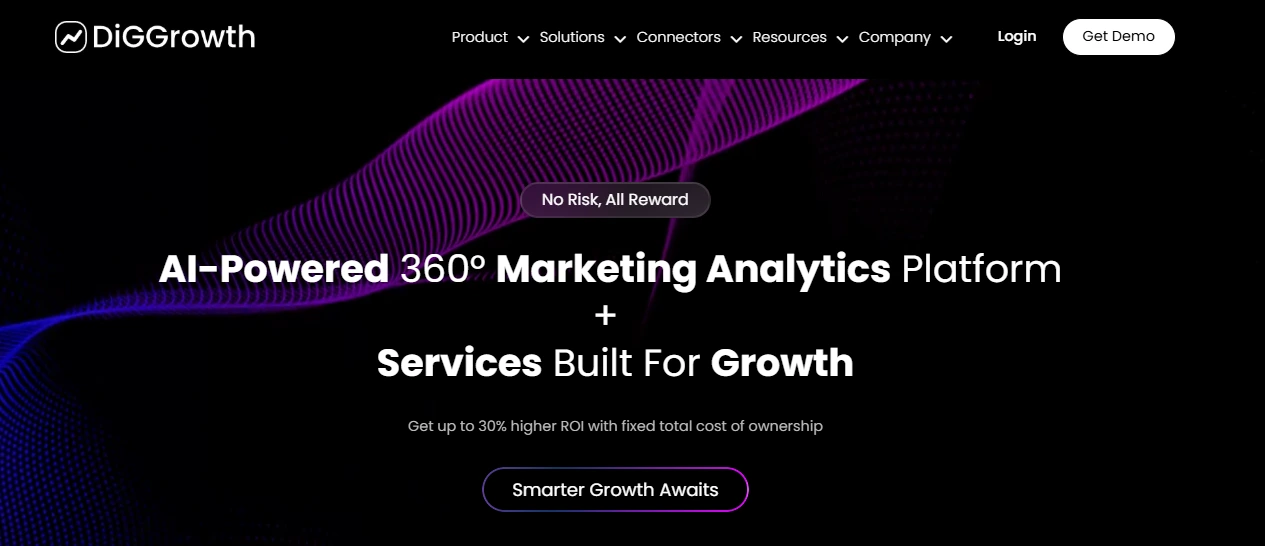
DiGGrowth is an AI-powered Account-Based Marketing (ABM) and analytics platform designed to help marketers optimize engagement, personalize outreach, and maximize conversions. The platform leverages real-time data, predictive analytics, and automation to streamline marketing efforts and drive high-value interactions with target accounts.
Key Features
- AI-Powered Insights:
- Real-Time Data Tracking:
- Predictive Lead Scoring:
- Cross-Channel Personalization:
- Seamless CRM & Martech Integrations:
Uses machine learning to analyze audience behavior, predict intent, and suggest personalized marketing strategies.
Provides instant performance metrics to fine-tune campaigns for better results.
Helps prioritize high-intent accounts, ensuring sales teams focus on the most promising prospects.
Enables businesses to create tailored experiences across email, ads, website interactions, and social media.
Works with major CRMs and marketing automation platforms for unified data insights.
How It Helps Marketers?
- Increases Engagement & Conversions:
- Reduces Wasted Ad Spend:
- Enhances Decision-Making:
- Improves Sales & Marketing Alignment:
Marketers can significantly improve response rates by delivering hyper-personalized content to the right audience at the right time.
AI-driven targeting ensures that marketing resources are allocated to accounts with the highest potential.
With deep insights and automated recommendations, marketing teams can refine strategies without relying on guesswork.
By integrating with CRM and marketing tools, DiGGrowth ensures a seamless transition from lead nurturing to sales conversion.
2. Drift
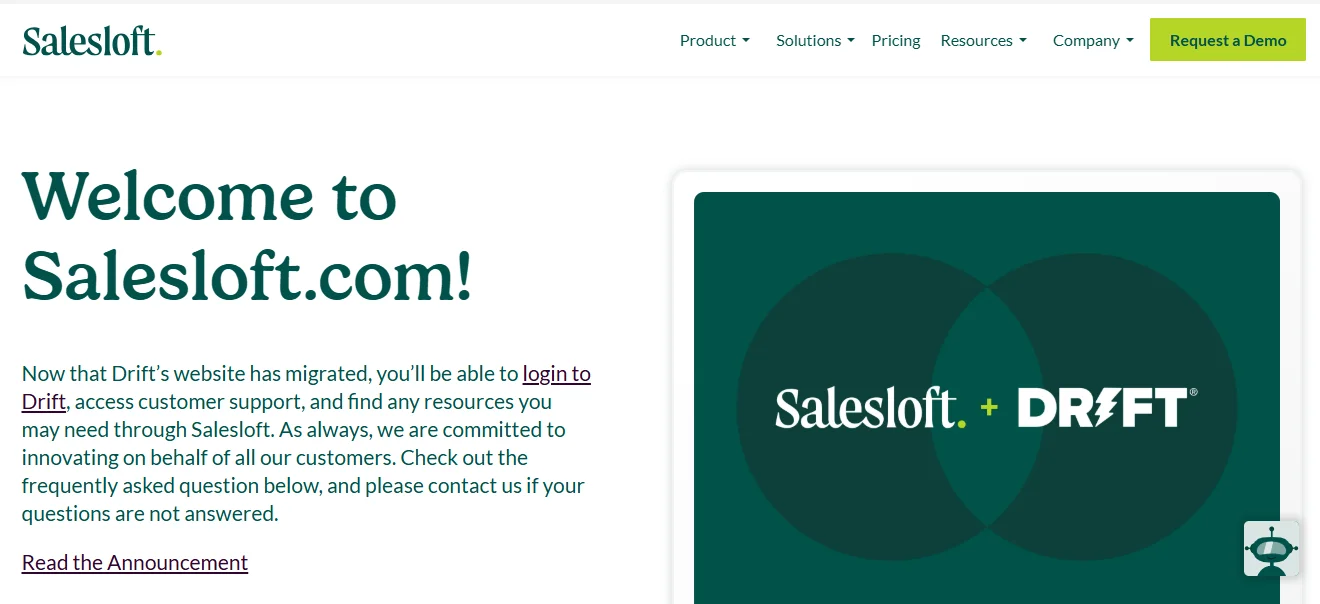
Drift is an AI-powered conversational marketing platform that automates customer interactions through chatbots and real-time messaging. It engages website visitors based on their behavior and intent, providing personalized conversations that guide them through the buying journey.
Key Features
- AI-driven chatbots for lead engagement
- Real-time messaging to personalize interactions
- Automated meeting scheduling for sales teams
How It Helps Marketers: Drift improves customer engagement by facilitating real-time conversations, ensuring prospects receive instant responses, and increasing lead conversion rates.
3. 6sense
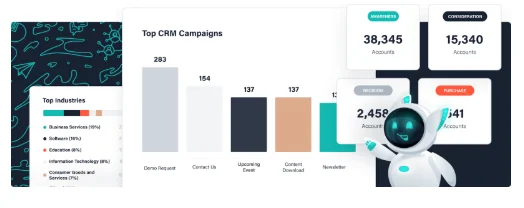
6sense leverages intent data and AI to predict buying behavior, helping B2B marketers deliver highly relevant and timely content. It identifies in-market accounts and provides actionable insights for targeted outreach.
Key Features
- Predictive analytics for buyer intent
- AI-powered account insights
- Personalized campaign recommendations
How It Helps Marketers: 6sense enables marketers to prioritize leads, tailor messaging to audience intent, and maximize conversion potential.
4. Pathmatics
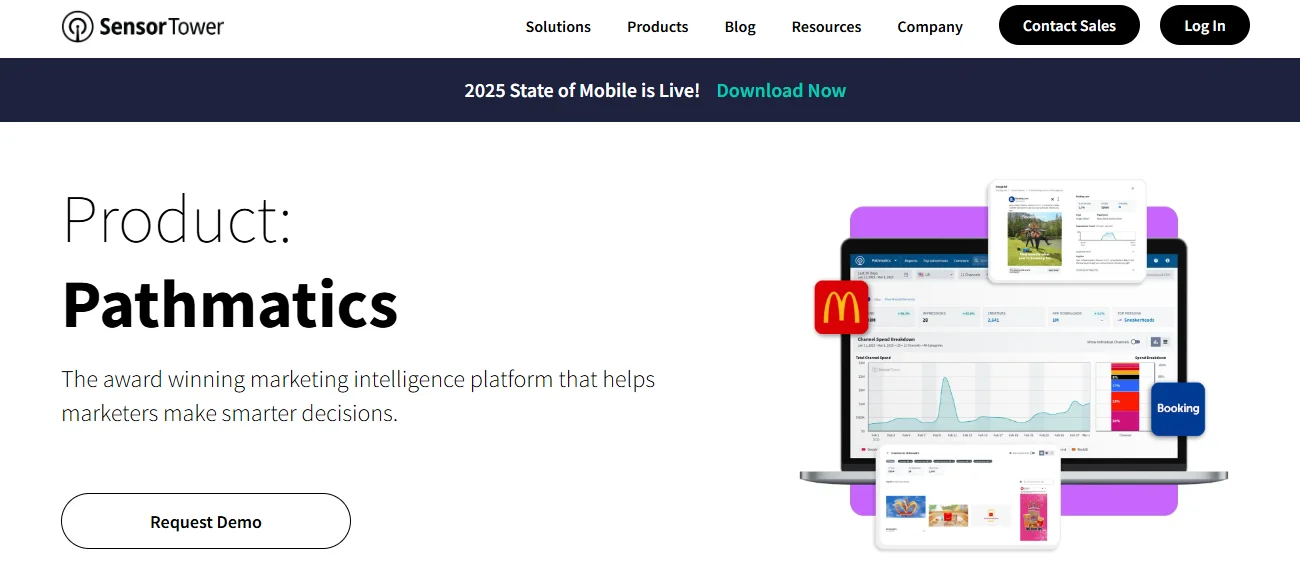
Pathmatics provides AI-driven ad intelligence by tracking competitor ad strategies and audience behaviors. It offers insights into ad placements, spending, and engagement trends.
Key Features
- Competitive ad tracking
- Audience behavior insights
- AI-powered ad performance analysis
How It Helps Marketers: Marketers can refine their advertising strategies, optimize budgets, and improve targeting by leveraging competitor insights.
5. Conversica

Conversica is an AI sales assistant that automates lead follow-ups and nurtures prospects until they are ready for direct sales engagement.
Key Features
- AI-powered lead nurturing
- Automated follow-ups
- CRM integration for seamless workflow
How It Helps Marketers: Conversica reduces the manual effort in lead nurturing, ensuring no opportunity is missed and boosting conversion rates.
6. Demandbase
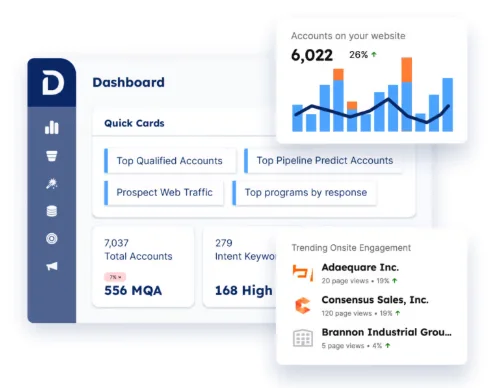
Demandbase is an AI-driven ABM platform that analyzes firmographic, technographic, and engagement data to help marketers create hyper-personalized account-based strategies.
Key Features
- AI-powered account targeting
- Data-driven insights for personalization
- Automated engagement tracking
How It Helps Marketers: It ensures businesses reach the right decision-makers with personalized outreach, improving account engagement and conversions.
Comparison Table: AI-Powered Marketing Tools
| Tool | Description | Why You Need This | Pro | Con |
| DiGGrowth | AI-driven insights, predictive analytics, and real-time personalization for targeted engagement. | Optimizes marketing efforts by automating personalization and improving conversion rates. | Provides deep data insights and real-time recommendations. | Requires a learning curve for full utilization. |
| Drift | Uses AI chatbots and real-time messaging to engage prospects. | Automates lead engagement and improves conversions. | Enhances real-time interactions. | Requires advanced setup for workflows. |
| 6sense | Analyzes intent data to predict buying behavior. | Delivers timely, relevant content to high-intent prospects. | Strong predictive capabilities. | Data accuracy depends on integrations. |
| Pathmatics | Tracks competitor ad strategies and audience behaviors. | Helps refine ad spending and targeting. | Offers detailed competitor insights. | Limited to digital ad intelligence. |
| Conversica | Automates lead follow-ups and nurtures conversations. | Reduces manual effort and ensures consistent lead nurturing. | Improves sales efficiency. | May feel robotic if not fine-tuned. |
| Demandbase | Uses AI to analyze firmographic and technographic data for ABM. | Ensures hyper-personalized outreach to key accounts. | Provides deep data insights. | Can be expensive for small businesses. |
Case Study: How a Renowned B2B SaaS Company Achieved 2.5x Higher ROI with DiGGrowth
The Challenge
A leading B2B SaaS company struggled with ineffective targeting, low engagement rates, and manual lead qualification. Their marketing and sales teams operated in silos, leading to missed opportunities and longer sales cycles.
The Solution
The company integrated DiGGrowth, an AI-powered ABM platform, to enhance targeting, automate personalization, and improve lead scoring. Key implementations included:
- AI-Driven Account Intelligence –
- Predictive Lead Scoring –
- Personalized Engagement –
- Seamless CRM Integration –
Identified high-intent accounts using real-time behavioral signals.
Ranked leads based on engagement, allowing sales to focus on the most promising prospects.
Delivered tailored content and adaptive email sequences based on account behavior.
Ensured marketing and sales teams had synchronized data for efficient follow-ups.
The Results
- 31% increase in lead-to-opportunity conversions by targeting the right accounts.
- 42% higher engagement rates through AI-driven personalization.
- Sales cycle reduced by 28%, enabling faster deal closures.
- 2.5x ROI growth, optimizing marketing spend and increasing conversions.
Key Takeaways
AI-driven personalization and predictive analytics significantly improve ABM outcomes. By automating lead qualification and delivering real-time insights, DiGGrowth helped the company streamline workflows, enhance engagement, and drive higher revenue.
Common Misconceptions About AI-Based Personalization in ABM
“AI removes the human element” – Why This Is a Myth
AI-driven personalization eliminates the need for human involvement in marketing and sales. AI enhances human decision-making by automating repetitive tasks, analyzing vast data sets, and providing actionable insights. Marketers and sales teams can focus on strategic relationship-building, creative content development, and high-value interactions while AI handles data-driven personalization.
“It is only for enterprise-level businesses” – How AI Scales for All ABM Models
AI-powered ABM is often perceived as a solution only for large enterprises with extensive budgets. However, AI tools are designed to be scalable, catering to businesses of all sizes. Small and mid-sized companies can leverage AI for smarter targeting, automated engagement, and data-driven decision-making without requiring extensive resources. Many AI-driven ABM platforms offer flexible pricing and customization to fit different business needs.
“AI takes too long to implement” – How Quick Integrations Drive Faster Results
A common concern is that implementing AI-based personalization is time-consuming and complex. However, modern AI solutions integrate seamlessly with existing CRMs, marketing automation tools, and analytics platforms. Many AI-powered ABM tools come with pre-built templates, guided workflows, and no-code configurations, enabling businesses to see results in weeks rather than months.
“AI personalization refers to the use of artificial intelligence (AI) to tailor messaging, product recommendations and services to individual users. By analyzing data and learning from user behavior, AI-powered tools can create highly personalized encounters that enhance customer experiences and increase customer engagement.” — IBM
Conclusion
AI-driven personalization is no longer optional for B2B marketers—it is essential for staying competitive. By leveraging AI-powered insights, businesses can engage the right accounts at the right time with highly relevant messaging, leading to increased conversions and revenue growth. Companies that adopt AI in ABM will see measurable improvements in targeting, engagement, and efficiency, while those sticking to traditional methods risk falling behind.
Transform your ABM strategy with AI-powered personalization.
Just write to us at info@diggrowth.com and we’ll get back to you.
Ready to get started?
Increase your marketing ROI by 30% with custom dashboards & reports that present a clear picture of marketing effectiveness
Start Free Trial
Experience Premium Marketing Analytics At Budget-Friendly Pricing.

Learn how you can accurately measure return on marketing investment.
How Predictive AI Will Transform Paid Media Strategy in 2026
Paid media isn’t a channel game anymore, it’s...
Read full post postDon’t Let AI Break Your Brand: What Every CMO Should Know
AI isn’t just another marketing tool. It’s changing...
Read full post postFrom Demos to Deployment: Why MCP Is the Foundation of Agentic AI
A quiet revolution is unfolding in AI. And...
Read full post postFAQ's
AI enhances ABM by optimizing account selection, automating lead qualification, predicting deal closure timelines, and aligning marketing with sales through data-driven insights, ensuring more efficient targeting and improved revenue outcomes.
Yes, most AI-powered ABM solutions integrate with CRMs, marketing automation platforms, and analytics tools, enabling seamless data synchronization, automated workflows, and real-time personalization without disrupting existing marketing processes.
Absolutely. AI continuously analyzes engagement signals, intent data, and behavioral trends, allowing businesses with long sales cycles to nurture prospects effectively, deliver timely content, and engage decision-makers at the right stages of the buying journey.
AI-powered ABM platforms comply with data privacy regulations by anonymizing data, using secure data encryption, limiting access to sensitive information, ensuring personalized outreach while maintaining customer trust and regulatory compliance.
Challenges include data quality issues, integration complexities, and the need for proper training. However, businesses can overcome these by ensuring clean datasets, choosing AI tools with seamless integrations, and gradually scaling AI implementation.


